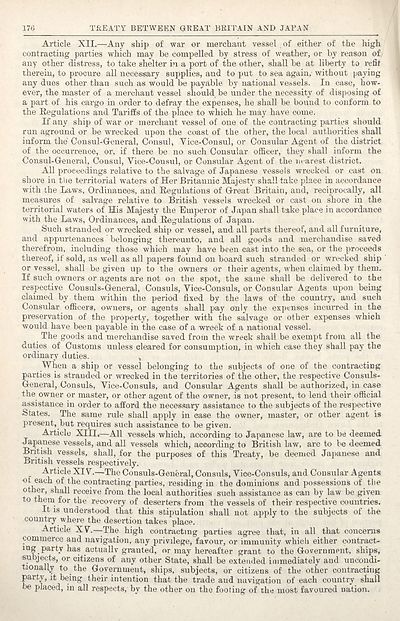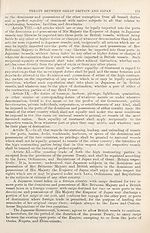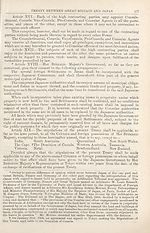1918
(244) Page 176
Download files
Complete book:
Individual page:
Thumbnail gallery: Grid view | List view

176
TREATY BETWEEN GREAT BRITAIN AND JAPAN
Article XII.—Any ship of war or merchant vessel of either of the high
contracting parties which may be compelled by stress of weather, or by reason of
any other distress, to take shelter in a port of the other, shall be at liberty to refit
therein, to procure all necessary supplies, and to put to sea again, without paying
any dues other than such as would be payable by national vessels. In case, how¬
ever, the master of a merchant vessel should be under the necessity of disposing of
a part of his cargo in order to defray the expenses, he shall be bound to conform to
the Begulations and Tariffs of the place to which he may have come.
If any ship of war or merchant vessel of one of the contracting parties should
run aground or be wrecked upon the coast of the other, the local authorities shall
inform the Consul-General, Consul, Vice-Consul, or Consular Agent of the district
of the occurrence, or, if there be no such Consular officer, they shall inform the
Consul-General, Consul, Vice-Consul, or Consular Agent of the nearest district.
All proceedings relative to the salvage of Japanese vessels wrecked or cast on
shore in the territorial wraters of Her Britannic Majesty shall take place in accordance
with the Laws, Ordinances, and Begulations of Great Britain, and, reciprocally, all
measures of salvage relative to British vessels wrecked or cast on shore in the
territorial waters of His Majesty the Emperor of Japan shall take place in accordance
with the Laws, Ordinances, and Begulations of Japan.
Such stranded or wrecked ship or vessel, and all parts thereof, and all furniture,
and appurtenances belonging thereunto, and all goods and merchandise saved
therefrom, including those which may have been cast into the sea, or the proceeds
thereof, if sold, as well as all papers found on board such stranded or wrecked ship
or vessel, shall be given up to the owners or their agents, when claimed by them.
If such owners or agents are not on the spot, the same shall be delivered to the
respective Cousuls-General, Consuls, Vice-Consuls, or Consular Agents upon being
claimed by them within the period fixed by the laws of the country, and such
Consular officers, owners, or agents shall pay only the expenses incurred in the
preservation of the property, together with the salvage or other expenses which
would have been payable in the case of a wreck of a national vessel.
The goods and merchandise saved from the wreck shall be exempt from all the
duties of Customs unless cleared for consumption, in which case they shall pay the
ordinary duties. ,
When a ship or vessel belonging to the subjects of one of the contracting
parties is stranded or wrecked in the territories of the other, the respective Consuls-
General, Consuls, Vice-Consuls, and Consular Agents shall be authorized, in case
the owner or master, or other agent of the owner, is not present, to lend their official
assistance in order to afford the necessary assistance to the subjects of the respective
States. The same rule shall apply in case the owner, master, or other agent is
present, but requires such assistance to be given.
Article XIII.—All vessels which, according to Japanese law, are to be deemed
Japanese vessels, and all vessels which, according to British law, are to be deemed
British vessels, shall, for the purposes of this Treaty, be deemed Japanese and
British vessels respectively.
Article XIV.—The Consuls-General, Consuls, Vice-Consuls, and Consular Agents
■° ifaCk °f the contracting parties, residing in the dominions and possessions of the
other, shall receive from the local authorities such assistance as can by law be given
to them for the recovery of deserters from the vessels of their respective countries.
It is understood that this stipulation shall not apply to the subjects of the
country where the desertion takes place.
Article XV.—The high contracting parties agree that, in all that concerns
commerce and navigation, any privilege, favour, or immunity which either contract-
ing party has actually granted, or may hereafter grant to the Government, ships,
subjects, or citizens of any other State, shall be extended immediately and uncondi¬
tionally to the Government, ships, subjects, or citizens of the other contracting
party, it being their intention that the trade and navigation of each country shall
be placed, in all respects, by the other on the footing of the most favoured nation.
TREATY BETWEEN GREAT BRITAIN AND JAPAN
Article XII.—Any ship of war or merchant vessel of either of the high
contracting parties which may be compelled by stress of weather, or by reason of
any other distress, to take shelter in a port of the other, shall be at liberty to refit
therein, to procure all necessary supplies, and to put to sea again, without paying
any dues other than such as would be payable by national vessels. In case, how¬
ever, the master of a merchant vessel should be under the necessity of disposing of
a part of his cargo in order to defray the expenses, he shall be bound to conform to
the Begulations and Tariffs of the place to which he may have come.
If any ship of war or merchant vessel of one of the contracting parties should
run aground or be wrecked upon the coast of the other, the local authorities shall
inform the Consul-General, Consul, Vice-Consul, or Consular Agent of the district
of the occurrence, or, if there be no such Consular officer, they shall inform the
Consul-General, Consul, Vice-Consul, or Consular Agent of the nearest district.
All proceedings relative to the salvage of Japanese vessels wrecked or cast on
shore in the territorial wraters of Her Britannic Majesty shall take place in accordance
with the Laws, Ordinances, and Begulations of Great Britain, and, reciprocally, all
measures of salvage relative to British vessels wrecked or cast on shore in the
territorial waters of His Majesty the Emperor of Japan shall take place in accordance
with the Laws, Ordinances, and Begulations of Japan.
Such stranded or wrecked ship or vessel, and all parts thereof, and all furniture,
and appurtenances belonging thereunto, and all goods and merchandise saved
therefrom, including those which may have been cast into the sea, or the proceeds
thereof, if sold, as well as all papers found on board such stranded or wrecked ship
or vessel, shall be given up to the owners or their agents, when claimed by them.
If such owners or agents are not on the spot, the same shall be delivered to the
respective Cousuls-General, Consuls, Vice-Consuls, or Consular Agents upon being
claimed by them within the period fixed by the laws of the country, and such
Consular officers, owners, or agents shall pay only the expenses incurred in the
preservation of the property, together with the salvage or other expenses which
would have been payable in the case of a wreck of a national vessel.
The goods and merchandise saved from the wreck shall be exempt from all the
duties of Customs unless cleared for consumption, in which case they shall pay the
ordinary duties. ,
When a ship or vessel belonging to the subjects of one of the contracting
parties is stranded or wrecked in the territories of the other, the respective Consuls-
General, Consuls, Vice-Consuls, and Consular Agents shall be authorized, in case
the owner or master, or other agent of the owner, is not present, to lend their official
assistance in order to afford the necessary assistance to the subjects of the respective
States. The same rule shall apply in case the owner, master, or other agent is
present, but requires such assistance to be given.
Article XIII.—All vessels which, according to Japanese law, are to be deemed
Japanese vessels, and all vessels which, according to British law, are to be deemed
British vessels, shall, for the purposes of this Treaty, be deemed Japanese and
British vessels respectively.
Article XIV.—The Consuls-General, Consuls, Vice-Consuls, and Consular Agents
■° ifaCk °f the contracting parties, residing in the dominions and possessions of the
other, shall receive from the local authorities such assistance as can by law be given
to them for the recovery of deserters from the vessels of their respective countries.
It is understood that this stipulation shall not apply to the subjects of the
country where the desertion takes place.
Article XV.—The high contracting parties agree that, in all that concerns
commerce and navigation, any privilege, favour, or immunity which either contract-
ing party has actually granted, or may hereafter grant to the Government, ships,
subjects, or citizens of any other State, shall be extended immediately and uncondi¬
tionally to the Government, ships, subjects, or citizens of the other contracting
party, it being their intention that the trade and navigation of each country shall
be placed, in all respects, by the other on the footing of the most favoured nation.
Set display mode to:
![]() Universal Viewer |
Universal Viewer | ![]() Mirador |
Large image | Transcription
Mirador |
Large image | Transcription
Images and transcriptions on this page, including medium image downloads, may be used under the Creative Commons Attribution 4.0 International Licence unless otherwise stated. ![]()
| Asian directories and chronicles > 1918 > (244) Page 176 |
|---|
| Permanent URL | https://digital.nls.uk/194896502 |
|---|
| Attribution and copyright: |
|
|---|---|
| Description | Volumes from the Asian 'Directory and Chronicle' series covering 1917-1941, but missing 1919 and 1923. Compiled annually from a multiplicity of local sources and research. They provide listings of each country's active corporations, foreign residents and government agencies of all nationalities for that year, together with their addresses. Content includes: various treaties; coverage of conflicts; currencies and taxes; consular fees; weights and measures; public holidays; festivals and traditions. A source of information for both Western states and communities of foreigners living in Asia. Published by Hongkong Daily Press. |
|---|---|
| Shelfmark | H3.86.1303 |
| Additional NLS resources: |

